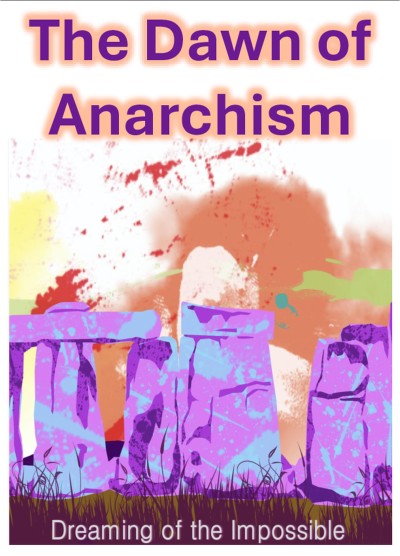The Dawn of Anarchism
Dreaming of the Impossible

| Date: | 2024 |
|---|---|
| Organisation: | Irish Anarchist Network |
| Type: | Pamphlet |
| View: | View Document |
| Discuss: | Comments on this document |
| Subjects: |
Please note: The Irish Left Archive is provided as a non-commercial historical resource, open to all, and has reproduced this document as an accessible digital reference. Copyright remains with its original authors. If used on other sites, we would appreciate a link back and reference to The Irish Left Archive, in addition to the original creators. For re-publication, commercial, or other uses, please contact the original owners. If documents provided to The Irish Left Archive have been created for or added to other online archives, please inform us so sources can be credited.
Commentary From The Cedar Lounge Revolution
3rd February 2025
Many thanks to the person who forwarded this to the Archive.
This pamphlet is the first document we have from the Irish Anarchist Network. As noted in the Archive the ‘The Irish Anarchist Network is a network of anarchists founded in 2022’.
For more information on the IAN this podcast from the Left Archive hears from two activists in the group. And this podcast with Gregor Kerr discusses their involvement in the Dublin Anarchist Bookfair.
Produced in 2024 it contains an essay by Conor Kostick. It notes: Some bittersweet thoughts inspired by David Graeber & David Wengrow’s The Dawn of Everything.
It considers that text and argues that far from there being an inevitable progression, whether under capitalism or Marxism, instead the historical and prehistoric record suggests that there were large cities as far back as 12,000 years ago and this cuts against theories of hunter-gatherers who then underwent an agricultural revolution and then class society (urban and rural).
It further argues that:
What makes anarchism different is that it is not trying to invent a story of progress to justify itself. That’s why David Wengrow and David Graeber can look at the evidence from the past with curiosity, playful imagination, insight and an openness to re-evaluating their own views. They are not obliged to make it conform to a self-serving model. For decades, important knowledge about the past, available right under our noses, was not visible by either left or right because their current political practice and their projected goals depended on ignoring it.
And:
To imagine a utopia existed in the past is to become demoralised in the present. To imagine a utopia might exist in the future, though, now that’s liberating. And what is required from the past that allows for a possible utopian future? Plasticity. If the past embodies not laws of history, but variation, invention and imagination, if it demonstrates that humans have lived in all kinds of ways, including non-hierarchical ones, then it allows us freedom to invent our own futures.
Comments
No Comments yet.
Add a Comment
Comments can be formatted in Markdown format . Use the toolbar to apply the correct syntax to your comment. The basic formats are:
**Bold text**
Bold text
_Italic text_
Italic text
[A link](http://www.example.com)
A link
You can join this discussion on The Cedar Lounge Revolution
By: Hamid Mon, 03 Feb 2025 10:23:26
What makes anarchism different is that it is not trying to invent a story of progress to justify itself. That’s why David Wengrow and David Graeber can look at the evidence from the past with curiosity, playful imagination, insight and an openness to re-evaluating their own views. They are not obliged to make it conform to a self-serving model.
So much like closely-related libertarianism doesn’t make a lick of sense in the real world, got it
Reply on the CLR
By: Aaron Tue, 04 Feb 2025 00:12:33
Right so I guess what we’ve learned is:
“…an openness to re-evaluating their own views.”
Doesn’t make sense in the real world. Gotcha.
Reply on the CLR
By: Conor Kostick Tue, 04 Feb 2025 21:14:39
In reply to Aaron.
Any particular argument in the essay that doesn’t make sense to you?
Reply on the CLR